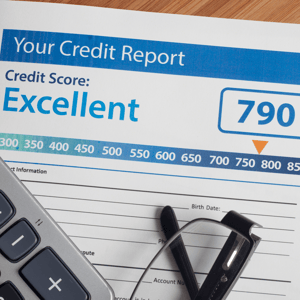It’s important to know what role your credit score plays in your mortgage application - and it's a huge one. Not only will this score determine how much you’ll be able to borrow, but it will also determine the interest rate at which you borrow, who you can borrow from, and your chances of getting approved.
In this post, we'll outline what your credit score is, how it impacts your ability to get a mortgage, how to improve it and more.
What Is Your Credit Score?
At its most basic level, your credit score indicates the health of your finances, which shows lenders the level of risk they will be taking on in giving you a loan. Credit scores range between 300 and 900, with a higher score indicating better financial health and less liability.
If you're someone with a credit score above 700, this tells lenders you manage your finances well, whereas a score below 600 indicates to lenders they're taking on significant risk in lending to you. The bigger the risk you're perceived to be, the higher the interest rate on your loan.
How Do I Find Out My Credit Score?
Credit-reporting agencies, such as Equifax Canada and TransUnion, collect information from lenders (banks and other financial institutions) and, for a fee, use this to give you your credit score.
What Causes My Credit Score to Go Up or Down?
There are a number of things that can cause your credit score to fluctuate, and it's important to recognize the biggest culprits to ensure your score goes up and not down.
- Do you pay on time? If you’ve missed payments, paid them late or have accounts that are overdue, this negatively affects your credit.
- How much credit do you use? For example, if you're maxing out your credit cards, this doesn’t look good on a credit report.
- How long have you had credit? Some financial experts will advise you not to rid yourself of your credit cards, as this produces less of a credit history.
Who Will I Be Able to Borrow From?
The lower your credit score, the less likely certain lending institutions will be willing to provide you with a mortgage. Because of this, you'll have to pay a much higher interest rate. For example, if your credit score is above 600, you'll be able to borrow from a major bank at a low interest rate. However, if you have a score under 600, you're limited to borrowing from private lenders at a higher rate they feel will balance out the risk.
A mortgage pre-qualification may also be a good place to start to give you some idea as to what you could qualify for, prior to seeking a mortgage pre-approval.

How Can I Improve My Credit Score?
There are several things you can do to improve your credit. However, many of these steps will take some time, so your credit score won’t change overnight.
- Pay off your credit card in full, every month. If you aren't able to do this, then at least make the payments on time, always paying at least the minimum required.
- Don’t apply for too many credit cards. Doing so will negatively affect your credit as it tells lenders you're in need of lines of credit to make ends meet.
- Don’t use more than 35% of your available credit. For example, if you have a credit limit of $10,000, then only use a maximum of $3,500 every month. This shows lenders that you aren't relying solely on your lines of credit to pay your bills.
- Hold onto your oldest credit card. Using this card responsibly establishes a growing credit history the longer you hold onto it.
A Few More Things...
While your credit score will play a significant role in your mortgage application, there are a few other factors to keep in mind. This includes the state of your employment, which other financial obligations you might have (such as debt or RRSP loan payments), how large your down payment is, and the details of your mortgage.
So, while you'll want to pay special attention to your credit score, it's not the only thing considered when your mortgage application is reviewed. But to ensure you're in the best position when you do apply, make sure you're doing everything you can to improve it. We also recommend you request a credit report every year so you can spot any problems that may pop up
Now that you know what you need to do to keep your credit score strong, it's time to look at which type of mortgage is best for you before you apply.




